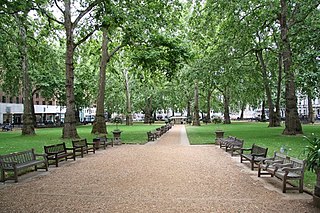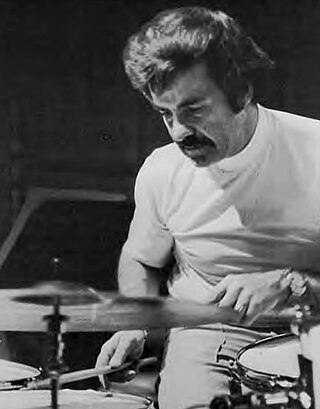Traditional pop is Western pop music that generally pre-dates the advent of rock and roll in the mid-1950s. The most popular and enduring songs from this era of music are known as pop standards or American standards. The works of these songwriters and composers are usually considered part of the canon known as the "Great American Songbook". More generally, the term "standard" can be applied to any popular song that has become very widely known within mainstream culture.
"Mack the Knife" or "The Ballad of Mack the Knife" is a song composed by Kurt Weill with lyrics by Bertolt Brecht for their 1928 music drama The Threepenny Opera. The song tells of a knife-wielding criminal of the London underworld from the musical named Macheath, the "Mack the Knife" of the title.

"A Nightingale Sang in Berkeley Square" is a British romantic popular song written in 1939 and published in 1940, with lyrics by Eric Maschwitz and music by Manning Sherwin.

Michael Steven Bublé is a Canadian singer and songwriter. Born in Burnaby, British Columbia, he is often credited for helping to renew public interest and appreciation for traditional pop standards and the Great American Songbook. Bublé has sold over 75 million records worldwide, and won numerous awards, including five Grammy Awards and fifteen Juno Awards.

Frank Rosolino was an American jazz trombonist.
"All of You" is a popular song written by Cole Porter and published in 1954.
"Tenderly" is a popular song published in 1946 with music by Walter Gross and lyrics by Jack Lawrence. Written in the key of E♭ as a waltz in 3
4 time, it has since been performed in 4
4 and has become a popular jazz standard. Notable versions have been recorded by singers, such as Sarah Vaughan, Billie Holiday, and Nat King Cole, and pianists, such as Art Tatum, Bill Evans and Peruchín.
"Moonlight in Vermont" is a popular song about the U.S. state of Vermont, written by John Blackburn (lyrics) and Karl Suessdorf (music) and published in 1944. It was introduced by Margaret Whiting in a 1944 recording.
"I'm Beginning to See the Light" is a popular song and jazz standard, with music written by Duke Ellington, Johnny Hodges, and Harry James and lyrics by Don George and published in 1944.
"I've Got The World on a String" is a 1932 popular jazz song composed by Harold Arlen, with lyrics written by Ted Koehler. It was written for the twenty-first edition of the Cotton Club series which opened on October 23, 1932, the first of the Cotton Club Parades.
"The Best Is Yet to Come" is a 1959 song composed by Cy Coleman to lyrics by Carolyn Leigh. It is associated with Frank Sinatra, who recorded it on his 1964 album It Might as Well Be Swing accompanied by Count Basie under the direction of Quincy Jones. It was the last song Sinatra sang in public, on February 25, 1995, and the words "The Best is Yet to Come" are etched on Sinatra's tombstone. Although Sinatra made it popular, the song was written for and introduced by Tony Bennett.
"I've Got a Crush on You" is a song composed by George Gershwin, with lyrics by Ira Gershwin. It is unique among Gershwin compositions in that it was used for two different Broadway productions: Treasure Girl (1928), when it was introduced by Clifton Webb and Mary Hay, and Strike Up the Band (1930), when it was sung by Doris Carson and Gordon Smith. It was later included in the tribute musical Nice Work If You Can Get It (2012), in which it was sung by Jennifer Laura Thompson. When covered by Frank Sinatra he was a part of Columbia Records.
"A Foggy Day" is a popular song composed by George Gershwin, with lyrics by Ira Gershwin. The song was introduced by Fred Astaire in the 1937 film A Damsel in Distress. It was originally titled "A Foggy Day " in reference to the pollution-induced pea soup fogs that were common in London during that period, and is often still referred to by the full title.
The commercial recording by Astaire for Brunswick was very popular in 1937.

Jack Sperling was an American jazz drummer who performed as a sideman in big bands and as a studio musician for pop and jazz acts, movies, and television.
Lawrence Benjamin Bunker was an American jazz drummer, vibraphonist, and percussionist. A member of the Bill Evans Trio in the mid-1960s, he also played timpani with the Los Angeles Philharmonic orchestra.
I Hadn't Anyone Till You" is a popular song written by Ray Noble in 1938. It has been recorded by many artists and is regarded as a standard.
"Indian Summer" is an American standard originally written as a piano piece by the prolific composer Victor Herbert. Al Dubin wrote lyrics for the tune in 1939, twenty years after Herbert wrote the tune.

"I Cover the Waterfront" is a 1933 popular song and jazz standard composed by Johnny Green with lyrics by Edward Heyman. The song was inspired by Max Miller's 1932 best-selling novel, I Cover the Waterfront.

Robert William Haymes, also known by the stage names Robert Stanton and Bob Stanton, was an American singer, songwriter, actor and radio and television presenter. He is best remembered for co-writing the song "That's All", part of the Great American Songbook. He was the younger brother of singer and actor Dick Haymes.
Charles Curtis Berghofer is an American double bassist and electric bassist, who has worked in jazz and as a session musician in the film industry for more than 60 years, including working on more than 400 movie soundtracks.





